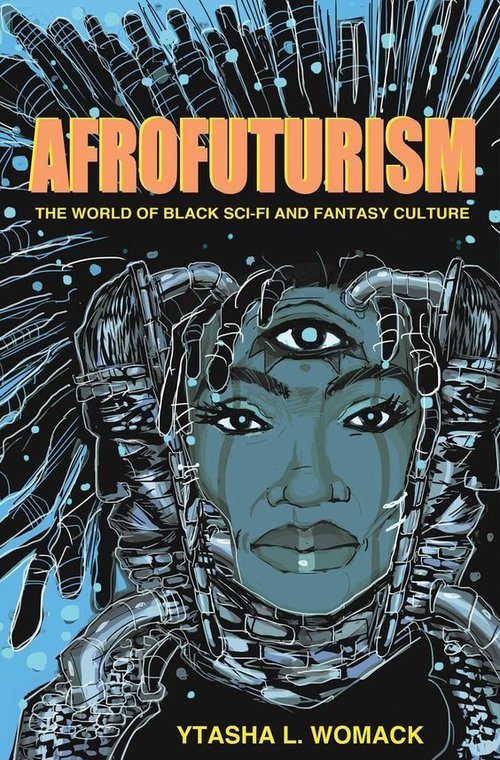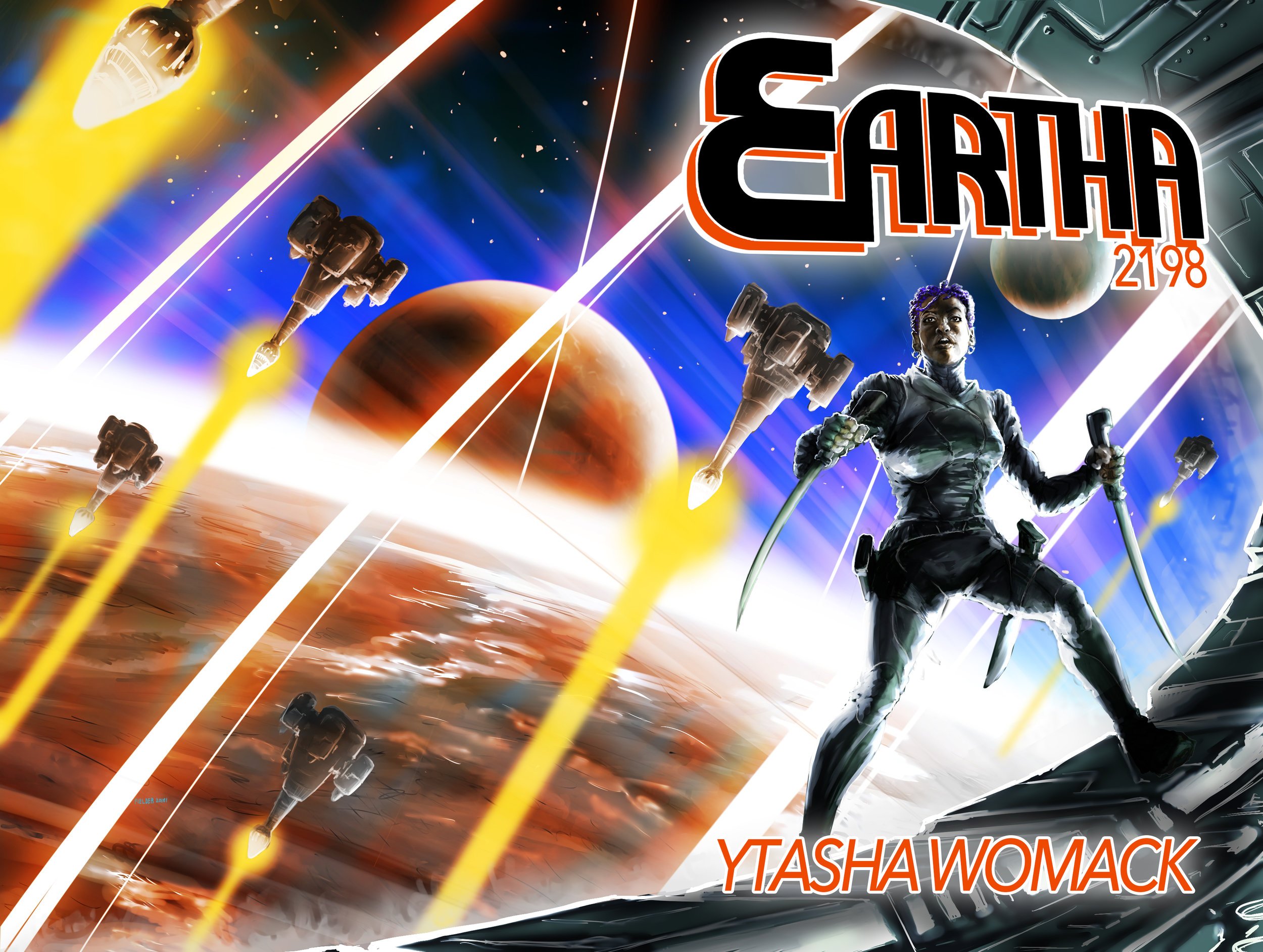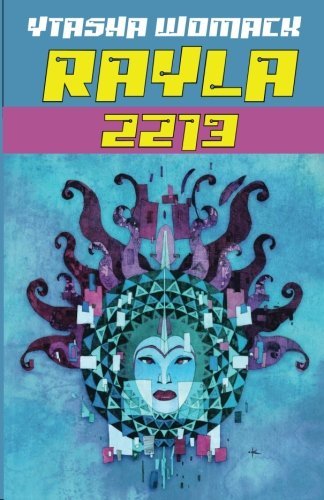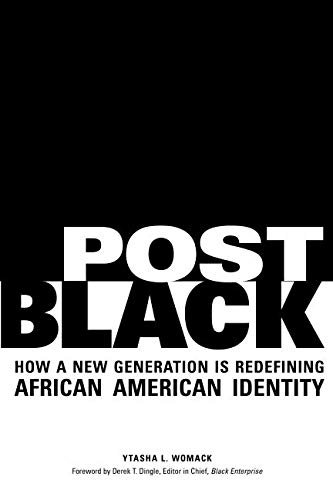TORRENTS HIGHLIGHTS: Ytasha Womack
We are excited to present Ytasha L. Womack, a critically acclaimed author, filmmaker, dancer, independent scholar, and champion of humanity and the imagination. We interviewed her this week to highlight her interdisciplinary achievements and influence on the topic of Afrofuturism and the growth of creative media as a whole.
Ytasha Womack was one of our panelists in the inaugural Torrents: New Links to Black Futures, where she participated in the “Living Myths Film Panel” with Shaka King, Alex Aggrey, and Merawi Gerima following the screening of Smithsonian Channel's "Afrofuturism: The Origin Story,” in which interviews with Womack are prominently featured. You can listen to the panel discussion on our podcast.
Her book Afrofuturism: The World of Black Sci Fi & Fantasy Culture (2013) is the leading primer on the exciting subject which bridges science fiction, futurisms, and culture. The book is a 2014 Locus Awards Non Fiction Finalist.
Womack tours the world championing Afrofuturism and the role of the imagination. Her works in Afrofuturism have been translated into Portuguese and Spanish for markets in Brazil and Latin America. Afrofuturism is taught in high schools and universities across the world.
Her film "A Love Letter to the Ancestors From Chicago" (2017) is an Afrofuturist dance film. It was featured in Afropunk Brooklyn, Black(s) to the Future Fest in Paris, Cultura IberaAmericana in Cuba, Afrotopia in Bristol, England, Reel Time Film Fest in Lagos, Nigeria and the Black Harvest Film Fest in Chicago among others. The film won Best Experimental Film at the Collected Voices Festival.
She's currently developing other Afrofuturist films including Bar Star City (www.barstarcity.com).
Rayla 2212, a time travelling/reincarnation book series follows the character Rayla Illmatic and inspired the Race in Space Conference at Duke University.
She's published essays in the anthologies Black Quantum Futurism: Space Time Collapse, Artists Against Police Brutality. The short Afrofuturist Prince ode "For Digital Girls Who Drink Tonic Water When Purple Rain isn't Enough" appeared in Jalada.com and 2709 Books (Spanish Translation).
Womack's other books include Rayla 2213 (2016), Post Black: How a New Generation is Refining African American Identity (2010), which was a Booklist Top 10 Black History Reader, and Beats, Rhymes and Life: What We Love & Hate About Hip Hop (2007).
Her films include the romantic comedy Couples Night (2018/screenwriter) starring Tony Rock and Reagan Gomez Preston; The Engagement (Director) starring Bernadette Stanis and Clifton Davis, and Love Shorts (Producer/Writer). She was also coproducer for the documentary Tupac: Before I Wake and appeared on E True Hollywood Story’s Rappers Wives documentary as a guest commentator.
Womack frequently lectures and keynotes conferences on Afrofuturism, innovation, and science fiction around the world. She's a frequent panelist at Comic Cons across the country. Womack also leads youth dance programs and cultivated a an Afrofuturism dance therapy program for teens and adults.
A Chicago native, she began her career as a journalist. She is a former editor-at-large for Upscale Magazine and former reporter/columnist for the Chicago Defender. She guest edits for NV Magazine and her works have appeared in Huffington Post, Chicago Tribune, Ebony, Essence, VIBE, and more.
She received a BA in Mass Media Arts from Clark Atlanta University and studied Arts, Media, and Entertainment Management at Columbia College Chicago. She has a certificate in Metaphysics Studies (Better Living) from the Johnnie Coleman Institute.
Below is our conversation with Womack on her influences, community, and themes of Afrofuturism:
Q: Can you tell me about your background and what drove you to pursue creating Black Panther: A Cultural Exploration?
A: I started off as a reporter writing about culture and music. I had an entertainment column with the Chicago Defender and wrote for other outlets. My work led me to observe trends in the culture, some of which weren’t being acknowledged by media or cultural organizations. These insights led to my book Post Black: How a New Generation is Redefining African American Identity. This futures forward thinking led me to write the book Afrofuturism: The World of Black Sci Fi & Fantasy Culture. As I was researching the book, I became immersed in the independent Black and Brown comic book scenes. At that time, I learned more about Marvel’s Black Panther comic character. Of course this was years before the film came out. I was struck by this character being one that a lot of people would love but were unaware of his existence. Yet, the character had loyal fans who championed his existance. When I was asked to write the book Black Panther: A Cultural Exploration, I really wanted to bridge this character and story’s symbolism with both the fans and the need that the character addressed. I think of the book as a people’s history of the comic, one shaped by the writers, illustrators, fans, and the culture.
Q: Torrents: New Links to Black Futures examines critical questions about the development of Black futures across the African diaspora by featuring innovators across industries. What does Black future building mean to you?
A: Black Futures Building is Sankofa in action. Sankofa is the Akan work and symbol which means to retrieve. It’s okay to go back to your roots. It’s okay to bring the best of the past into the future. This way of thinking and creating keeps us connected to sustaining values, recovering valuable lessons, while adapting and innovating in new worlds and times.
Q: What got you into science fiction and the concept of Afrofuturism?
A: For most of my childhood I wanted to be a scientist. I was pretty set on being a paleontologist or archeologist. I was a child who wanted to know the answers to ‘why?’ The ‘why’ question takes you straight to science and history. I felt a connection between both. As a kid in the arts who was trained in dance and music, I just felt all of these ideas were interconnected. The arc of Black histories was a throughline that pointed to a future. I felt it was our responsibility to imagine a better one and reach for it. I was raised in a metaphysical Church community that valued the imagination. But when I was in college at Clark Atlanta University, I met a friend who was talking about quantum physics, ancient African technologies, hip hop, and liberation. I asked him did he call this? What was his foundation? He said he didn’t know. That question stayed in my subconscious. As I connected with more people who shared this thought process, one evident in the culture around us, I sought out tangible ways of talking about it. A decade later I would meet someone who told me she was teaching Afrofuturism and it took me straight back to freshman year in college. I felt obligated to write about Afrofuturism because I knew so many Afrofuturists who literally didn’t know they were Afrofuturists. They didn’t know there was a larger community of people thinking time and space from African/African Diasporic vantage point of science, or history, or art, music, or social justice.
Q: How would YOU define Afrofuturism?
A: Afrofuturism is a way of looking at the future or alternate realities through Black cultural lenses. It’s an art aesthestic in that you can identify it in fashion and film. It’s an ontology, a way of knowing yourself and the world. It’s a practice that can help people reconnect with the imagination and African/African Diasporic ideas. If you think of Afrofuturism as a wheel, with Black cultures at the center, the spokes in the wheel are the imagination, technology, liberation, and mysticism. Afrofuturism values intuition, nonlinear time, and African wisdom systems. All cultures have a relationship to space and time and African/African Diasporic cultures are no different in that regard.
Q: Are there any books, media, or resources that influenced your pursuit of Black Panther: A Cultural Exploration?
A: I’ve spent a number of years attending comic book conventions and science fiction conventions. Honestly, the best resource are the people in the comics world who champion culture: the creators, comic book store owners, cosplayers, con programmers, those who teach comics, and readers of the comics themselves. This community is deeply committed to the form and create both the environment and the works that keep these characters alive. By talking to them, one can understand the deep meaning, excitement, and disappointments that come with the evolution of Black comic characters. When it comes to understanding the Black Panther character there’s no better reference than reading the Black Panther comics. The comic series are now available as collections in graphic novel format. The comic is full of Easter eggs and bread crumbs with references.
In thinking about comics perspectives I would suggest the books Black Comix edited by John Jennings and Dameon Duffy along with It’s Life as I see it: Black Cartoonist in Chicago, 1940-1980 edited by Dan Nadel. There’s an interesting history of the kinds of stories Black comic creators fought to tell, the ones they were able to share as comic strips in 20th century Black newspapers and magazines, as well as the freedom that came with the self publishing explosion and social media as marketing, of the first decade or two of this century. Black Panther and the creation of Wakanda reflect a long history of both literature and historical moments that sought to create protopias that valued liberation for Black people. Being familiar with African independence movements, Haitian Revolutions, Ethiopia’s resistance against colonization, and civil rights movements in the US helps explain why Wakanda as an idea is so important to people. Wakanda is an imagined free space that echoes the efforts works, and created spaces of others. I think of Sun Ra’s Alter Destiny in his album Space is the Place or the Funktopias in George Clinton’s P Funk world where the Mothership is bringing utopia as comprobable imaged spaces. Also, the books Blake or the Huts of America by Martin Delaney in 1859 and Of One Blood by Paula Hopkins in 1903. Both were originally written as newspaper series exploring freedom and liberation. Blake, or Huts of America follows a character who seeks to create a Black, free nation in Cuba during the years of enslavement in the Antebellum South. Delaney played a big role in bringing African Americans to live in Africa in the Civil War’s aftermath long before Marcus Garvey’s movement. Of One Blood follows a character who finds a technologically and mystically advanced city hidden in Ethiopia.
Q: Can you recall a time when you all had to make tough judgments when working on the production of your most recent book or other creative pursuits?
A: Yes. While writing about the Dora Milaj and their Dahomey woman warrier inspirations, I was asked by an editor to add context to the Dahomey’s history in the TransAtlantic Slave trade. So yes, the Dahomey women warriors are proof of the fictive Amazons come to life. They fought off colonizers. In one sense they are these kick butt ladies, some who were in precarious positions before joining the army. On the other hand, they were used to raid African villages in partnership with colonizers that resulted in people such as myself and millions of others being descendents of the awful enslavement period. So being asked to talk about that history and still thread how the valient Dora Milaj can be a reworking of a complex historical inspiration was a big ask and difficult emotionally. Nevertheless, it was also essential to telling the story.
In writing about Afrofuturism, I’m writing about a cultural relationship to space and time. There’s the task of explaining that people have a cultural relationship to space and time, ethnic, national, gendered, and otherwise, while also providing examples from a range of African/African Diasporic pantheons which may challenge their provincial idea of what Blackness is. The fun part is making connections that fire up someone’s synapsis while also grounding them in the familiar. But if someone isn’t familiar with Black cultures or the ones you’re referencing, it can sound as if you’re speaking about some ethereal space phenomenon when you are in fact talking about a culture created on Earth. Moreover, Black cultures don’t exist in isolation, so they are reflections of and are always in conversation with varying human experiences. Asserting that African/African Diasporic cultures has a relationship to space and time as well as a relationship to a future rubs against some people’s idea of how one acquires knowledge and how it’s shared, or what knowledge is of value. Sometimes it rubs against someone’s groundfloor basis for reality. The emotion and commentary that surfaces from that is an interesting one to navigate.
Q: What about your work most excites you?
A: The fun part for me is making connections. I like the ‘aha’ moments of finding answers or relationships between ideas, histories, and futures. I like making or helping to make those connections for others. Often times we learn or take in information without the full context. I like proviing context. I like reading, writing, and sythesizing information.
Q: What do you have coming up that you can speak about?
A: I have a book called The Afrofuturist Experience which will debut in 2024. I have a graphic novel that I wrote, Blak Kube, which is illustrated by Tanna Tucker. The book debuts in 2025. Later this year, an animation about the multiverse that I wrote with Taylor Witten will run at the Adler Planetarium in Chicago. I also have to remind everyone that the Afrofuturism exhibit is running at the National Museum of African American History & Culture through February 2024.
Q: What would you like to see as the "future" of Afrofuturism?
A: I’m happy to see that the popularity of Afrofuturism and Marvel’s Black Panther has helped popularize the value of the imagination in thinking about futures and the present. I would like to see more films, tv, video games, events, exhibits etc in Afrofuturist worlds. I would like to see more people exploring these relationships to time and space as a way of rethinking our world and how we show up in it.
Q: How do you want people to find you and upcoming projects? (social media, websites, etc.)
A: You can follow me on IG @ysolstar, my website www.ytashawomack.com, or sign up for my newsletter ysolstar.substack.com




